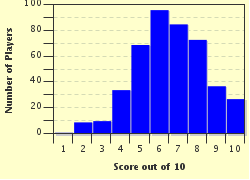Quiz Answer Key and Fun Facts
1. Pythagoras may be best known for his theorem about triangles, but legend has it that he instructed his followers not to eat a common food. Which one?
2. Sometimes what a person is forbidden to eat is based on his or her position in society. Which vegetable, although a staple food of the poor, was forbidden to be eaten by priests in ancient Egypt?
3. Few groups have more dietary restrictions than the Jews. Which of the following is something an observant Orthodox Jew could probably eat?
4. Roman Catholics have traditionally been required to abstain from eating meat on which day of the week?
5. If you have a Hindu friend from India coming over for dinner, which of these dishes should you NOT include on your menu?
6. Which of these meats won't you find on the menu in an Islamic country?
7. In case you think that food bans are only connected with religion or ancient superstitions, what food did the city of Chicago attempt to ban in 2006?
8. Undeterred by Chicago's 2006 failure, that State of Illinois did succeed in banning what traditional Chinese delicacy in 2012?
9. Sometimes foods are banned for strange reasons. What icon of American cuisine was banned from French elementary schools in 2011 for "cultural reasons"?
10. This isn't technically a food, but Singapore has a long-standing ban on what popular commodity?
Source: Author
daver852
This quiz was reviewed by FunTrivia editor
WesleyCrusher before going online.
Any errors found in FunTrivia content are routinely corrected through our feedback system.

